Shingles: Asphalt, Composite, Bitumen


Hart Roofing & Construction
Timeless Appeal of Asphalt Roofs
Asphalt shingle roofs, recognized as the most popular roofing material, boast an exceptional balance of durability, affordability, and aesthetic adaptability. Comprising individual asphalt roofing shingles applied onto the roof’s structure, they provide reliable weather protection while facilitating straightforward installation. The introduction of premium asphalt shingles elevates this option, seamlessly blending sophistication with the inherent strength of asphalt. Amidst a range of roofing options including slate tiles, metal, and other asphalt shingles, asphalt shingle roof stand is a steadfast choice, emblematic of a classic that has retained its prominence as a favored and dependable roofing solution for generations.
When it comes to roofing materials, there’s a plethora of options available, each with its own unique characteristics and benefits. Shingles are a popular choice for residential and commercial roofing due to their durability, versatility, and aesthetic appeal. In this blog post, we’ll delve into three prominent shingle materials: Asphalt, Composite, and Bitumen. We’ll explore what they are, their variations, cost advantages, life expectancy, and the types of roof structures they are best suited for.
Hart Roofing & Construction
What Are Asphalt Shingles?
Asphalt shingles are one of the most widely used roofing materials in the United States. They are composed of a fiberglass or organic base mat coated with asphalt and embedded with ceramic granules to enhance durability and UV protection. These shingles are available in a wide range of styles and colors, making them a versatile choice for various architectural designs.
- Three-Tab Asphalt Shingles: These are the most basic and cost-effective options. They have a traditional flat appearance and are suitable for budget-conscious projects.
- Architectural Asphalt Shingles: Also known as dimensional or laminated shingles, these provide a more textured and multi-dimensional look, mimicking the appearance of wood or slate.
Asphalt shingles are generally affordable and offer good value for their price. They strike a balance between cost, durability, and aesthetics, making them a popular choice for many homeowners.
The lifespan of asphalt roofs varies based on factors such as quality, climate, and maintenance. Three-tab shingles usually last around 20-25 years, while architectural shingles can last 30 years or more.
Asphalt shingles are suitable for a wide range of roof structures, from steep-sloped to moderate-sloped roofs. They are less commonly used on flat roofs due to potential water drainage issues.
Hart Roofing & Construction
Composite Shingles: A Blend of Performance and Style
What Are Composite Shingles?
- Synthetic Wood Shingles: These shingles mimic the look of cedar or other wood shingles but without the susceptibility to rot, insects, and weathering.
- Synthetic Slate Shingles: They capture the elegance of natural slate while being lighter and more affordable.
Composite shingles can be more expensive upfront compared to traditional asphalt shingles. However, their extended lifespan and reduced maintenance costs often justify the initial investment.
Composite shingles have a longer lifespan than traditional asphalt shingles, typically lasting 50 years or more, depending on the manufacturer and quality.
Composite shingles are versatile and can be used on various roof structures, including steep-sloped and moderate-sloped roofs. Their lightweight nature makes them a suitable option for a range of architectural designs.
Hart Roofing & Construction
Bitumen Shingles: Durability and Weather Resistance
What Are Bitumen Shingles?
Bitumen shingles, also known as asphaltic or modified bitumen shingles, are made from a blend of asphalt and either rubber or plastic modifiers. This combination enhances their weather resistance, flexibility, and overall durability.
- SBS Bitumen Shingles: These shingles are modified with Styrene-Butadiene-Styrene rubber, providing excellent flexibility and cold-weather performance.
- APP Bitumen Shingles: Modified with Atactic Polypropylene, these shingles are more heat-resistant and suitable for warmer climates.
Bitumen shingles are generally more expensive than traditional asphalt shingles due to their enhanced durability and weather resistance.
Bitumen shingles have a longer lifespan than standard asphalt shingles, usually lasting around 25-30 years or more.
Bitumen shingles are well-suited for steep-sloped roofs and are particularly suitable for regions with extreme weather conditions due to their superior resistance to temperature fluctuations and severe weather.
Choosing the right shingle material for your roof involves considering factors such as budget, aesthetics, climate, and roof structure. Asphalt, composite, and bitumen shingles offer a range of options to cater to various needs and preferences. Whether you prioritize affordability, longevity, or specific weather resistance, these shingle materials provide versatile solutions that can enhance both the functionality and visual appeal of your home or commercial property. Always consult with roofing professionals to determine the best fit for your specific project.
Hart Roofing & Construction
How Shingles Are Made and Choosing the Best for Your Roof
When it comes to roofing, the diversity of choices can be overwhelming. From luxury asphalt shingles to composite options, the market offers a plethora of materials to suit different needs. In this article, we will delve into the intricacies of shingle production, compare fiberglass and composite shingles with asphalt, explore the types of roofing shingles available, and guide you in choosing the best shingles for your roof.

Hart Roofing & Construction
Understanding How Shingles Are Made
Shingles are meticulously crafted roofing materials that undergo a multi-step manufacturing process. The process typically involves binding materials like asphalt or fiberglass with mineral granules for durability and protection against the elements. These materials are then pressed into various shapes and sizes to cater to different architectural designs.
Hart Roofing & Construction
Fiberglass Roof Shingles vs. Asphalt
Fiberglass roof shingles, often used interchangeably with asphalt shingles, are actually a type of asphalt shingle. The key difference lies in the base mat – fiberglass shingles incorporate a layer of fiberglass for added strength. These shingles offer enhanced fire resistance, making them a popular choice for safety-conscious homeowners.
Hart Roofing & Construction
Composite Roof Shingles: An Alternative Aesthetic
Composite roof shingles, another variety within the realm of asphalt shingles, blend different materials to achieve the appearance of luxury shingles, such as slate tiles or cedar shakes. While offering the elegance of luxury shingles, composite shingles maintain the ease of installation and cost-effectiveness associated with asphalt shingles.
Hart Roofing & Construction
Composite Roof vs. Shingles: A Versatile Duo
Composite roofs encompass a broad category, while composition shingles are a specific type of roofing material. Composition shingles, also known as asphalt shingles, are composed of a blend of asphalt, fiberglass, and mineral granules. While composition roofs can include composite shingles, they can also comprise other materials like wood or metal.
Hart Roofing & Construction
Selecting the Best Shingles for Your Roof
Selecting the best shingles for your roof involves considering factors such as your budget, climate, desired aesthetics, and long-term maintenance. While luxury asphalt shingles offer elegance and durability, standard asphalt shingles provide an ideal balance of affordability and functionality. Consulting with roofing professionals can help you make an informed decision.
Hart Roofing & Construction
Elevate Your Roofing Experience with Hart Roofing & Construction










